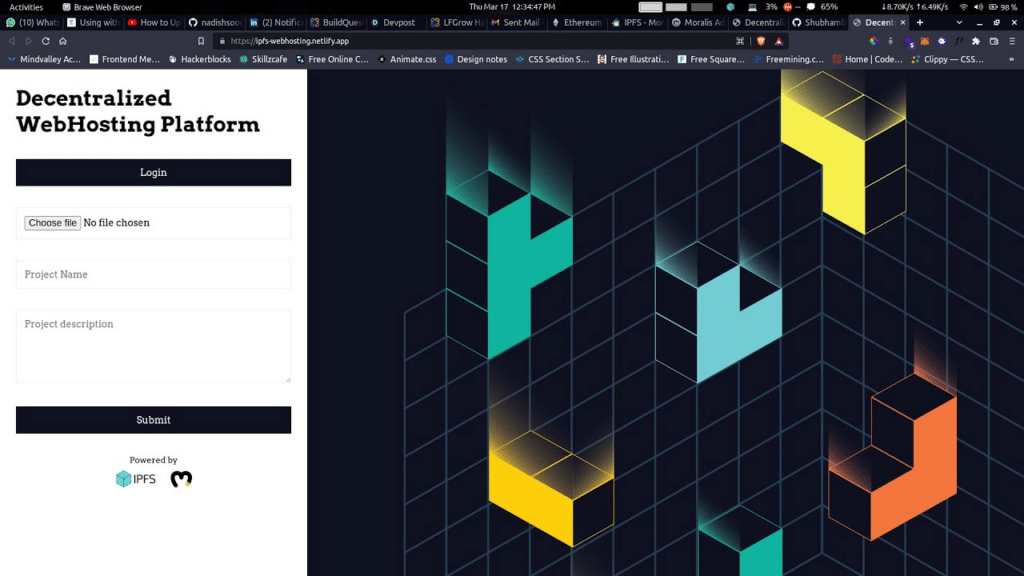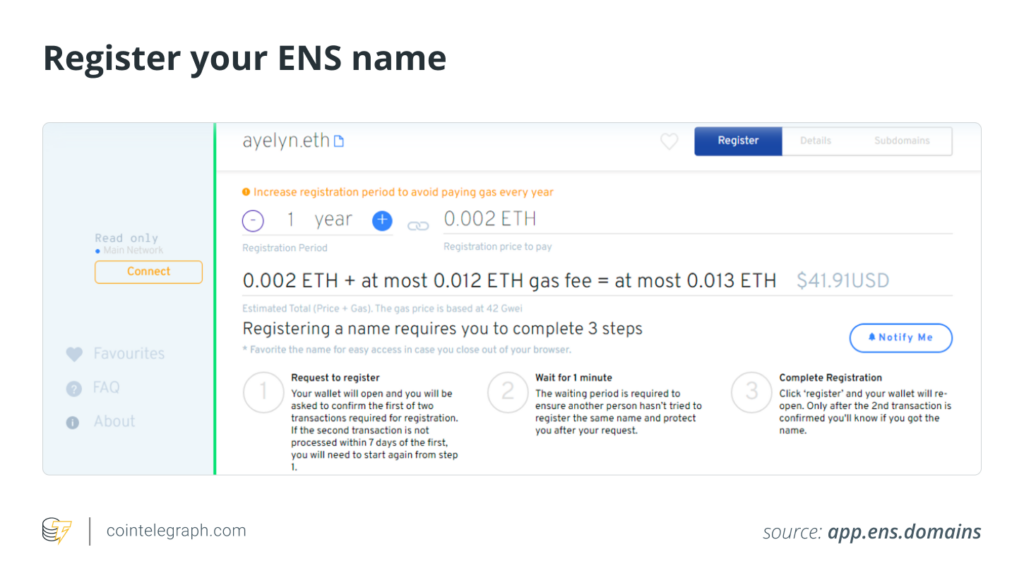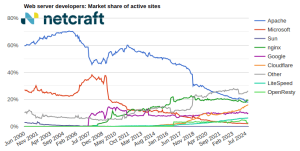
The internet has come a long way since its inception, with websites becoming an essential part of our daily lives. However—the traditional web hosting method has remained centralized, with websites stored on servers owned and controlled by a few companies.
Over the past few years, decentralization has gained popularity as a means of improving the security, privacy, and availability of online services. With the emergence of blockchain technology—decentralized web hosting, often known as web3, has become a viable alternative.
The worldwide blockchain market for Web3 was $1.73 billion in 2022. It is projected to expand at a CAGR of 47.1{3728c97f74b06e72d2b074bca575d40162b54b0d1060234c43f76ea5393aafc8} from 2023 to 2030. The demand for decentralized identity in Web3 and internet technology improvements drive data privacy growth.
Decentralized web hosting has various advantages over conventional web hosting. It makes websites less vulnerable to attacks and censorship as there is no central point of failure. It also enhances the privacy of website owners and visitors as data is distributed across multiple nodes.
Let us walk you through how to host a decentralized website and the tools and platforms available to simplify the process. But before we delve deeper—let us know what decentralized web hosting is.
Understanding decentralized web hosting
Decentralized web hosting refers to hosting websites and online content without relying on centralized servers or infrastructure. In traditional web hosting, websites are stored on servers owned and maintained by a few companies. However, in decentralized hosting, data is stored on a network of distributed computers, called nodes, that collaborate to serve the content.
One popular approach to decentralized web hosting is through the use of blockchain technology—which allows for a secure and transparent way of storing and sharing data. Content is stored on a peer-to-peer network, where every user is a node, and each node contributes computing power and storage to the network.
Decentralized hosting is vital because it marks a significant shift in the web3 that websites and online applications are hosted and used. Decentralized web hosting ensures enhanced security, redundancy, and censorship resistance.
This is achieved through the use of peer-to-peer networks, blockchain technologies, and other distribution methods that ensure website files remain accessible even during network failures or disturbances. Since there is no single point of failure, the possibility of server failures or data loss due to cyberattacks is significantly reduced.
Why is the development of decentralized web hosting necessary?
The centralized nature of the Internet has raised concerns over privacy, security, and censorship. A centralized system relies on a single control point, making it vulnerable to hacking, surveillance, and manipulation. Moreover, the power was substantially with a few giant corporations. They used to have direct control over all the data.

Decentralized web hosting, also known as peer-to-peer web hosting, allows users to host their websites on a network of computers instead of a single server. This approach removes the need for a central authority or hosting provider—as each node in the network contributes to the hosting process.
Web3 hosting development is committed to allowing free expression without censorship. Everyone is free to express their opinions and make their own choices. Therefore, the web hosting elements cannot be removed or blocked.
One of the key benefits of decentralized web hosting is increased security. With no central control point, hackers cannot target a single server to take down a website or steal data. Additionally, decentralized web hosting can provide greater privacy as data is stored across multiple nodes rather than in a centralized location.
Another advantage of decentralized web hosting is the potential to reduce censorship. Governments or other entities cannot quickly shut down a website if hosted on a decentralized network. This is particularly important in countries where freedom of speech is restricted or the internet is heavily regulated.
How to host a decentralized website
The idea of decentralized websites is still new, but they are gaining popularity. Hosting a decentralized website involves using a peer-to-peer network like IPFS (InterPlanetary File System) to host your website files.

When hosting a decentralized website, Web3 technologies and tools are needed to create and distribute website files via a network of nodes.
Let us delve deeper to learn more about Web3 hosting:
Create website files using blockchain
Web3 is a collection of technologies and tools that make it possible to create decentralized applications (dApps) on the blockchain. It is vital to understand what is blockchain technology and how it is used to store and validate data digitally, known as a distributed ledger.
To build a website using Web3 tools and technologies, developers can use frameworks to create smart contracts and interact with them using web3.js. Integrating with decentralized storage solutions like IPFS enables files to be stored in a distributed manner. Decentralized identity solutions will give users more control over their personal data and improve security. By combining these Web3 tools—developers can create decentralized websites that are more resilient, secure, and user-centric.
Select a domain name
A decentralized website is hosted on a server that is not controlled by a single entity and has a domain name that is also decentralized. This means the path to your website cannot be taken away, and no one can destroy the storage.

When selecting a domain name for decentralized web hosting, consider the following tips:
- Choose a name that reflects your business
- Keep it short and easy to remember
- Use a top-level domain (TLD) that is compatible with decentralized web hostings, such as .eth or .crypto
- Ensure that the domain name is unique and not already registered by someone else
- Consider purchasing multiple TLDs to protect your brand and prevent cybersquatting
- Use a decentralized domain registrar or marketplace to purchase your domain name securely
- Test your domain name to ensure that it works correctly with your decentralized web hosting solution
Archive data on the network
The next stage is network file storage; network files must be stored using IPFS or Swarm. To do this—the files must be broken up into smaller pieces and spread over the network. Making sure the files are kept in several different locations improves their security and durability.
To store files on the network during decentralized web hosting, you can follow these steps:

- Choose a decentralized storage solution that suits your needs and requirements
- Install the software required to use the chosen storage solution on your computer or server
- Upload your files to the decentralized storage network by adding them to your chosen storage solution
- Ensure your files are properly encrypted and secured before uploading them to the network
- Verify that your files have been uploaded and are accessible through the decentralized storage network
Link website files to the domain name
Once the website files are stored on the network, the domain name must be directed there. A Domain Name System (DNS) record connecting the domain name to the website’s files’ network location must be made to do this.
Make sure that your website files are uploaded to the decentralized storage solution and that they have a unique hash or identifier that you use to link them to your domain name.
It’s vital to note that the specific steps will vary depending on the chosen decentralized DNS or naming service and the decentralized storage solution used. Some services offer additional features or integrations to make the process easier.
Test your website
Testing your website during decentralized web hosting is essential to ensure that it works as expected and is accessible to users.
Test the website after the domain name has been linked to the files to ensure everything works as it must. Use a browser that supports Web3 to access the website. It’s also crucial to test the website’s functionality, user experience, and responsiveness. Comprehensive testing will help you identify and fix any issues before launching your website.

How does a decentralized website operate?
Here are the general steps for how a decentralized website works:
- Content Creation—The website content is created and stored locally on a user’s device.
- Content Distribution—The user’s device shares the content with other devices in the network using a peer-to-peer protocol, such as IPFS (InterPlanetary File System).
- Content Hosting—Each device that receives the content becomes a host and shares the content with other devices in the network. This creates a decentralized network of hosts that collectively serve the website’s content.
- Domain Name Resolution—To access a decentralized website, users need a domain name. Domain names are typically resolved using a decentralized naming system, such as Namecoin or Ethereum Name Service (ENS).
- Website Access—Users access the decentralized website by entering the domain name into a web browser. The browser will then use the decentralized naming system to locate the website’s content on the network of hosts.
Hosting a decentralized website
Create a website where you alone will decide whether to remove it or not. If you haven’t used the Web3 browser interface before—it takes time to get accustomed to and pick up new abilities—but the effort is worthwhile. Understanding the technical side of things, which will be very different from what consumers are used to on Web 2 browsers, is vital.



